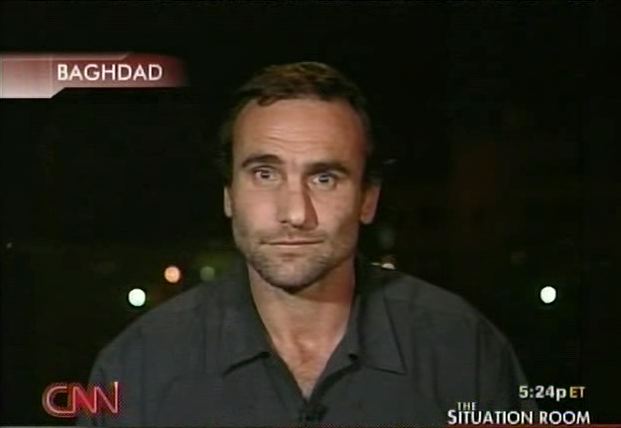
Michael Ware
TSR: "Something radical has to be done."

Click photo to play
Length: 4:00
WOLF BLITZER: We want to
get some more now about the Iraqi government and what
it's doing. Are some of the people who pledged to
protect Iraqis actually imposters bent on killing
them?
And joining us now in Baghdad, our correspondent
Michael Ware. What do you make of these reports,
Michael, that there are now these death squads that
have infiltrated the Iraqi police force potentially
causing all sorts of havoc?
MICHAEL WARE, CNN CORRESPONDENT: Well, Wolf, this has
been the way it has from the beginning. The death
squads have been a part of the Iraqi security
apparatus that has been propped up by the U.S.
forces. In fact, the death squads, certainly on the
Shia side, have become institutionalized in the sense
that the government themselves, or factions within
it, I should say, are running or operating these
death squads.
Indeed, the U.S. military intelligence says, for
example, Ministry of Interior commanders will rent
out official government vehicles at night to death
squads to allow them to operate. Iraqi security force
units patrolling the streets at night or manning
checkpoints allow the death squads through. And then
let them come back.
It is a pattern of the style of government that is
dominated by very particular Shia blocks, Wolf.
BLITZER: Do you see the Prime Minister Nouri
al-Maliki, himself a Shia, as having the
determination, the will, the guts to deal with these
militias, these death squads that have infiltrated
the police and other establishment forces in Iraq?
WARE: Well, this is what the U.S. is banking upon.
They are putting all their eggs in the Maliki basket
at the moment. This is a man who is relatively
powerless. He was a compromise candidate for the
prime ministership. All the big players saw him as
relatively neutral or manageable. He doesn't have a
militia of his own. He's a fringe player within a
broader powerful Shia block.
So the U.S. is attempting to prop him up. By
delivering security to Baghdad, they want him to take
the credit and develop a popular base, according to
State Department officials and U.S. military
intelligence officials I talked to, that would give
him a wedge against these all-powerful militias who
actually run the key elements of this government,
Wolf.
BLITZER: President Bush and Defense Secretary
Rumsfeld want the U.S. military, the U.S. policy to
stay the course, if you will, to continue doing what
it has been doing. Colin Powell is quoted as saying
today, "Staying the course isn't good enough because
a course has to have an end."
Does staying the course based on everything you are
hearing from U.S. military commanders and others,
that strategy, have an end?
WARE: Listen, Wolf, this is the way to put it in a
nutshell: if the U.S. continues its policy and
operations as they are now, the situation will worsen
and the enemies of the U.S., principally al Qaeda and
Iran, will continue to strengthen.
There's a number of options that are presented to
Washington at the moment. They either do this or they
don't do this. They either need to get serious about
the battle here on the ground, physically against al
Qaeda and the insurgency, and commit the troops that
the commanders need, or they need to look for
alternative solutions.
At the end of the day, what they are facing is
potential by most of this country being subsumed by a
Shia-led theocracy-style government, with other parts
of the government left as western al Qaeda desert
training camps and facilities. To avoid that,
something radical has to be done is the consensus.
So Colin Powell is right. Staying the course will
only further strengthen America's enemies. Wolf?
BLITZER: All right. Michael, thanks very much.
Michael Ware is our correspondent in
Baghdad.